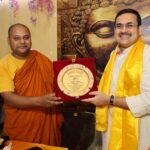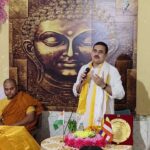REFLECTING THE SOUL OF INDIA
- By : Anirban Ganguly
- Category : Articles
One of the most articulate voices of Eastern education philosophy, Kireet Joshi was futuristic yet traditional
With the passing away of Kireet Joshi, pre-eminent education philosopher and administrator, the curtains have been drawn on a creative and vibrant era of Indian education which had derived direct inspiration from the National Education Movement of the early decades of the 20th century in India. Not that Kireet himself ever believed that he represented an era, preferring to look at himself rather as a humble worker surrendered to the cause of Indian education. But by opting to join, early in life, a multi-faceted education experiment that sought to give institutional shape to Sri Aurobindo’s principles of education, he became a continuing part of that early education movement which had attracted some of the best minds in India to converge and evolve an education that would, as he described it, essentially reflect and articulate the “soul of India.”
In fact, Kireet never ceased to refer to that dynamic period of Indian education which had produced some of the best and most profound educational expositions and to argue that the India of today needed to derive from and synthesise those thoughts in her present educational quest. “The country needs a kind of education”, he once wrote, “that is not yet being conceived, although the greatest pioneers of the freedom struggle have already given us the glimpses of that education.” In making such a demand, in his unequivocal demand for the promotion of Indian languages, for the popularisation of Sanskrit, for the institutionalisation of Vedic studies and for the need to evolve a method for value and cultural education, Kireet was the quintessential radical and often appeared to be impatient by calling for a complete overhaul of the present education system, the “legacy of our colonial past.”
Having been selected for the Indian Administrative Service, Kireet began his working life as Assistant Collector of Surat in 1956 and interestingly wound up his active life in 2010, as Education Adviser to the then Chief Minister of Gujarat and now Prime Minister of India, Mr Narendra Modi. In between unfolded a long, rich, multi-dimensional, prolific and continental journey in the cause of Indian education, Indian culture, Indian philosophy — it was, in short, a quest for the roots and expressions of ‘Indianness’. The call of a wider horizon, the urges of his svabhava and svadharma compelled Kireet to give up the privileges of officialdom and join the Mother in Puducherry in her great educational effort in giving shape to Sri Aurobindo’s vision of education.
Inspired by the Mother, Kireet believed that in a successful implementation of Sri Aurobindo’s principles of education, lay a way forward in evolving an education system that would be best suited to the Indian psyche and its civilisational aspirations. Between 1956 and 1976 — two decades which he often termed as the “golden period” of his life — Kireet formed part of an accomplished and dynamic group that had coalesced around the Mother, and, much in the same way as a distinguished group had assisted Tagore in his experiment at Visva Bharati, supported her in giving shape to Sri Aurobindo’s educational vision through the Sri Aurobindo International Centre of Education.
His unshakable sens du but saw him initiate a number of educational experiments that were futuristic yet emphasised that ancient Indian education need of discovering the “inmost centre of freedom in every child.” Kireet’s efforts, made directly under the tutelage of the Mother, evolved a pedagogical framework known as Integral Education. His actualisation of the Mother’s educational experiment attracted some of the keenest minds of the epoch such as DS Kothari, CD Deshmukh, RR Diwakar and KL Shrimali, all of whom were fascinated by the experiment in Puducherry.
It was in the late 1970s that he was called upon to work on a larger canvas when the then Prime Minister invited him to become Special Secretary for Education. Thus began Kireet’s national and global contribution to education which saw him found institutions, institute commissions, head educational bodies in the country and under the Unesco. Perhaps after S Radhakrishnan, Kireet’s was the most articulate voice of eastern education philosophy in that international body. Even at an advanced age his mind did not cease to formulate new visions. It was in Gujarat, under Mr Modi, that Kireet found an effective ambience of working out some of his last educational experiments. The unique Children’s University at Gandhinagar is another lasting contribution to Indian education.
Kireet’s civilisational vision sustained his relentless quest for imparting a new direction to Indian education, as he himself wrote towards the end, “If education has to reflect the soul of India, and if India has to prepare itself to fulfil its own swadharma; if India has to play a leading role in meeting the challenges of the contemporary civilisation and also the contemporary crisis; if India has to be protected from dogmatic or agnostic or sceptical materialism and its barbaric invasion — then India has to be revitalised and refashioned.” For Kireet, the perennial education-philosopher, such a revitalisation could be achieved in “some tolerable measure”, only if the Indian education system could be “redesigned” over the next decade.
It would be a befitting tribute to Kireet Joshi’s educational vision and contribution, to perhaps think, innovate and act along those lines.

















